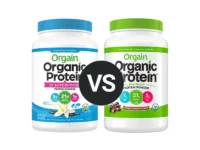Knowledge BaseYou're Questions Answered
BACK
Can protein powder cause constipation?
Yes, protein powder can cause constipation for some people. This can happen due to lactose intolerance or due to a protein-rich diet that is lacking in good fiber. Additionally, some protein powders may contain ingredients that can have a dehydrating effect, which can contribute to constipation.
To help avoid constipation when using protein powders, you can take the following steps:
- Increase fluid intake: Drink plenty of water and other hydrating fluids to help soften stools and prevent dehydration.
- Add fiber to your diet: Increase your fiber intake by eating plenty of fruits, vegetables, and whole grains to help regulate bowel movements.
- Gradually increase protein powder intake: Start with a small serving of protein powder and gradually increase the amount over time to give your body time to adjust.
- Choose a protein powder with added fiber: Some protein powders include added fiber, which can help to regulate bowel movements and prevent constipation.
- Use a different form of protein: If you are experiencing constipation with one type of protein powder, try switching to a different form of protein, such as a plant-based protein powder.
It's important to keep in mind that everyone's digestive system is different and what may work for one person may not work for another. If you experience persistent constipation or other digestive symptoms when using protein powder, it's best to speak with a healthcare provider for personalized advice.
Was this answer helpful? Let us know!
Like
Add to this Answer
Related Questions

Disclosure
Your Answer
Do you have a suggestion to improve the answer? Please detail your suggestions and provide any references to information that may support your answer if available.
The content on this site has not been written, reviewed or endorsed by a medical professional. We assume no liability for the misuse of supplements and recommend you review the label of any product, as well as consulting with your health care professional.
We are a participant in the Amazon Services LLC Associates Program, an affiliate advertising program designed to provide a means for us to earn fees by linking to Amazon.com and affiliated sites.
We are a participant in the Amazon Services LLC Associates Program, an affiliate advertising program designed to provide a means for us to earn fees by linking to Amazon.com and affiliated sites.
© 2026 ProteinPowder.com





